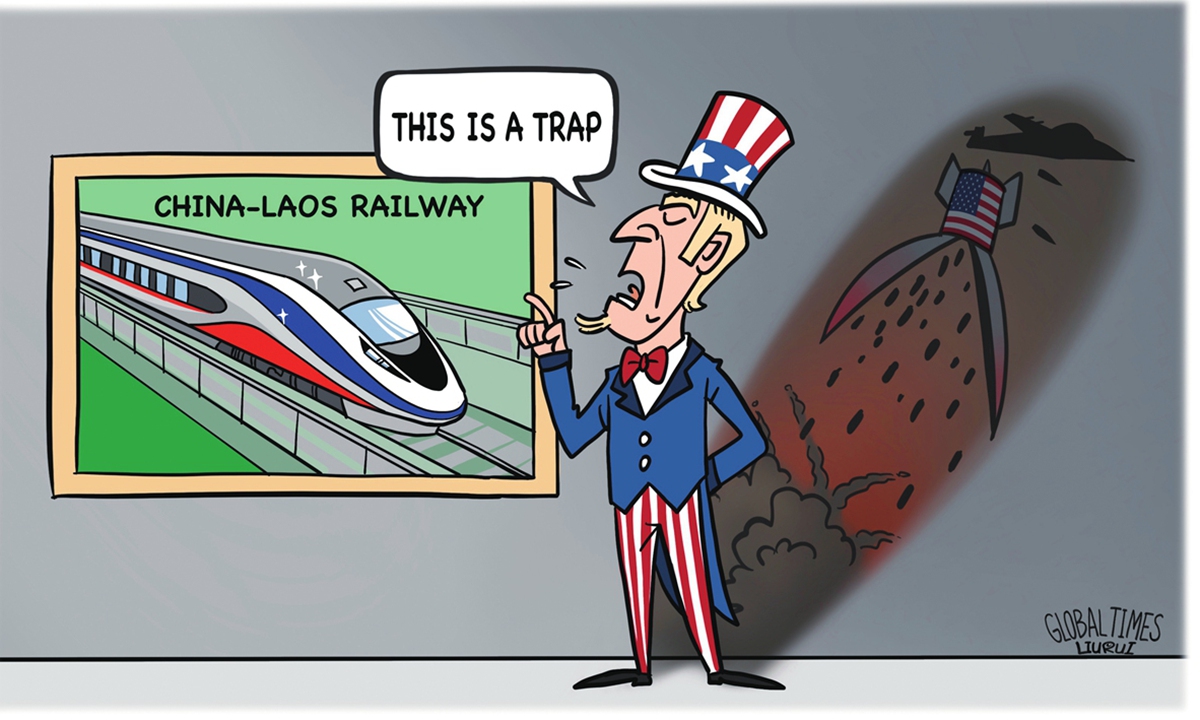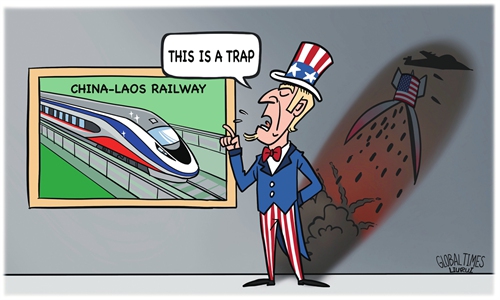US should clear up bombs it left in Laos before questioning China's influence there

Illustration: Liu Rui/GT
During Henry Kissinger's visit to Beijing last week, I was traveling in Laos. In conversations with Lao political and academic friends, I could always detect the presence of a shadow, that is, the influence of the US on Southeast Asia.
The US has a powerful presence in the region's economic, trade, political, and diplomacy spheres, even though the US and the region are separated by a vast ocean.
In Laos, looking around you feel like everything is from the past, like an old photo that has turned yellow but it's still clear. Older people will talk to you about the "secret wars" that the CIA orchestrated in Laos in the 1960s, and outside some houses, you will see American bomb casings erected. US warplanes dropped them on Laos decades ago, and sometimes they explode, injuring people nearby.
More than anything else, reality exists. When we talk about the Belt and Road Initiative, the cooperation in the Greater Mekong Region, there is always a mention of how the Americans see it, how the American media report it, and how they hype the so-called debt issue.
When a Hong Kong-funded company built a civilian airport in the Bokeo Province of Laos, US officials immediately came up to "visit" the region. It seems they were interested in more than just helping Laos remove the bombs.
A few days ago, the ISEAS-Yusof Ishak Institute, a Singaporean think tank, released a survey titled "Changing Perceptions in Laos Toward China," which said that more and more Laotian respondents are worried about China's economic influence. I wonder if the scholars who conducted the survey asked any Laotian farmers who benefited from eliminating bombs left by the US military by the Chinese companies or any Laotian employees who work for Chinese companies how much they earn per month.
In a recent report from the Chinese edition of the Voice of America, one scholar took the opportunity to call on Washington to commit to seizing the opportunity as a breaking point to check Beijing's expansion in Southeast Asia.
"Check and balance" immediately makes me think of Henry Kissinger. It is the primary tool of the strategy of equilibrium that Kissinger "created" and utilized. The US has used such a tool to balance the challenges and maintain its hegemonic position.
Looking back over the past sixty years of China-US relations, it is easy to see that China is no longer a force that the US needs to utilize to counterbalance a main adversary.
Now, China is a friend of the US' enemy and even its foremost and long-term rival. That is why it is the first target of the US to check and balance.
This concept of checks and balances has profoundly affected the geopolitical understanding of China's neighboring countries, which have come to a juncture where they must draw a line in the sand.
When I took the high-speed train from Luang Prabang to Vientiane, I saw that all the compartments were almost full of passengers, most of them were Laotians. I observed them getting on and off the train with big bags, and I suddenly had a feeling that the US was tired. Suppose the China-Laos high-speed rail is seen as the rising China's economic energy spillover, reflecting the common pursuit of the development of China and Southeast Asian countries. In that case, who will the US checks and balances favor? And, can the US be checked and balanced?
China is not the Soviet Union in the Cold War era. China's rise is all-encompassing and multi-layered, a wide-ranging engagement and intermingling with its neighbors and the world, including the US, in almost all fields of industry, education, finance, culture, etc., and likewise a process in which 1.4 billion people are running towards affluence through peaceful development.
After I visit Bokeo Airport, I would like to say one thing: Americans are welcome to Southeast Asia to participate in the development. The infrastructure China is helping to build there will surely be a boon to American investment.
However, the best way for Americans to gain the trust of the Laotians is to first clean up the bombs they left behind.
It's time for the Americans and those who follow them to jump out of the loop of the equilibrium theory that has gone out of fashion.
The author is a senior editor with People's Daily, and currently a senior fellow with the Chongyang Institute for Financial Studies at Renmin University of China. dinggang@globaltimes.com.cn. Follow him on Twitter @dinggangchina


